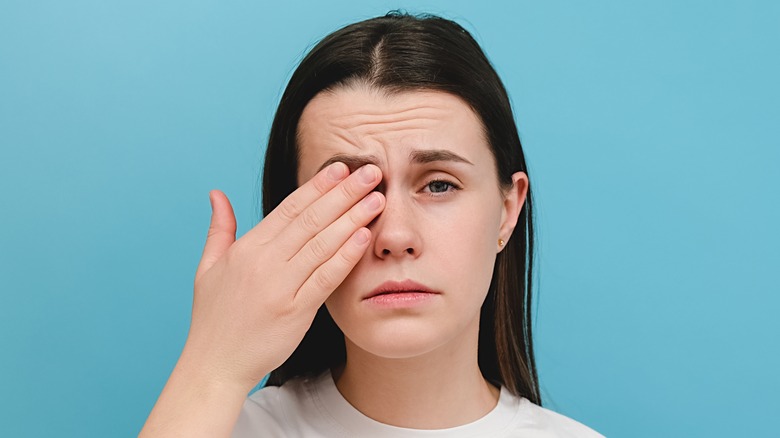Could Your Hormones Be The Reason Behind Your Dry Eyes?
If you experience burning, scratchy, and irritated eyes, you're not alone. According to the National Eye Institute, millions of Americans experience dry eye syndrome each year. Dry eyes, as the name implies, occur when the eyes lack lubrication from tears. Symptoms can include redness, blurred vision, light sensitivity, stinging, or a feeling of having debris in the eye.
Besides being uncomfortable, dry eyes can also lead to serious complications if left untreated. The Mayo Clinic explains that insufficient tears can lead to eye infections, cornea damage, and even vision loss in severe cases.
The causes of dry eyes can be straightforward, such as a lack of moisture in the air during cold-weather months. Not getting enough sleep and other lifestyle habits can also contribute to dry eye syndrome. In other cases, however, the root of the condition can extend far beyond what meets the eye. For example, dry eyes could indicate conditions such as lupus, Sjogren's syndrome, and vitamin A deficiency. Surprisingly, dry eyes may also be the result of hormone changes in some people.
The impact of hormones on eye health
Hormones affect nearly every part of the body, including the eyes. As WebMD explains, several types of hormone fluctuations can trigger dry eye syndrome. One hormone that plays a role in tear production is insulin. Without enough insulin — particularly in people with diabetes — the eyes' lacrimal glands can't secrete enough tears to keep the eyes moisturized. Treating diabetes by taking insulin may improve dry eye symptoms.
The thyroid hormone can also affect eye lubrication. Either high or low levels of the hormone — often associated with autoimmune diseases of the thyroid gland — can lead to dry eyes and other eye-related symptoms.
Finally, changes in sex hormones may trigger dry eyes. Though either sex may experience dry eyes, ophthalmologist Dr. Amy Lin told the University of Utah Health that females are more likely to have dry eyes than males due to naturally occurring hormone fluctuations.
Estrogen, progesterone, and testosterone can all influence tear production, though researchers aren't yet entirely sure why. So far, it's understood that pregnancy, menstruation, menopause, and using hormonal contraceptives may cause dry eyes in women. A 2018 study published in the journal Medicine suggested that hormone therapy could be used to treat dry eye syndrome, most notably in postmenopausal women. Still, more research is needed to understand how hormones can help — and hinder — eye lubrication.
If you're concerned that hormones could be behind your dry eye symptoms, visit a doctor for a thorough diagnosis and treatment options.


